Ofsted Deep Dive: What Happens, What You Need To Know And How To Prepare [2024]
The Ofsted deep dive is one of the key elements of the Ofsted Inspection Framework’s curriculum focus. An Ofsted inspection of any establishment, primary or secondary, small or large, will now include a ‘subject deep dive’.
This will be an in-depth look at a particular area of your curriculum (e.g. maths or EYFS) which Ofsted will decide on and inform you of prior to the inspection.
Here, we share what an Ofsted deep dive entails, what it looks like in practice, and how to prepare for it.
What is an Ofsted deep dive?
Two types of Ofsted inspections are routinely carried out. As of September 2022, the terminology for these has changed slightly.
- Graded inspections (previously section 5)
- Ungraded inspections (previously section 8)
Under the new Ofsted framework, both types of inspection involve a deep dive.
But what is a deep dive?
An Ofsted deep dive is an in-depth examination of a national curriculum subject by an Ofsted inspection team. It is part of the Ofsted inspectors’ remit to monitor the 3 Is – Intent, Implementation and Impact – of the curriculum.
Deep dives are no longer new! From Ofsted’s guidance and the experiences of those who have been through them, we know that an Ofsted deep dive methodology involves lesson observations with headteachers, book looks and discussions with subject leads etc.
According to the Ofsted Inspection Framework, or EIF, the intent behind a deep dive is to “establish a coherent evidence base on quality of education”; so multiple deep dives from Ofsted will give inspectors a connected sample of lessons with which to establish a clearer judgement of the overall teaching quality of the school.
Ofsted Deep Dive Preparation Framework
Help your school get ready for the new Ofsted inspections with this framework of the deep dive questions you can expect to be asked.
Download Free Now!What is the purpose of a deep dive?
The intent of a deep dive is to seek to interrogate and establish an evidence base on the quality of education within any given school setting.
During a deep dive, Ofsted gathers evidence of the curriculum intent, implementation and impact for between three and six particular subjects.
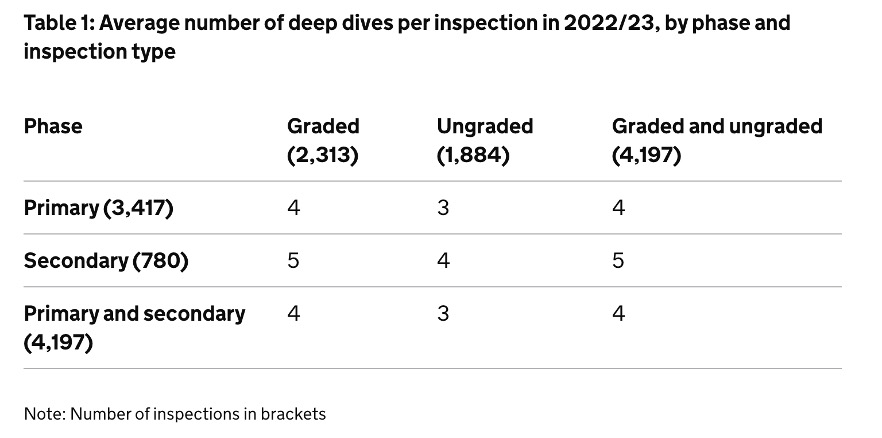
In collaboration with senior leaders, curriculum leaders, class teachers and pupils, Ofsted questions seek to judge whether the quality of education is good enough.
Who’s involved in an Ofsted deep dive?
The responsibility of a deep dive falls to almost all members of a school’s community.
Senior leaders
Before the inspection days, Ofsted conducts a 90-minute phone call with the headteacher and senior leaders to gather a top-level view of the school curriculum.
They do not need to see planning folders but focus on wide curriculum coverage, what the curriculum offers, curriculum sequencing and progression, and the individual subjects for deep dives.
Curriculum leaders
Inspectors will discuss individual deep dive subjects in more depth with subject leaders. They seek to understand:
- How subject leaders plan across the school
- The rationale for this
- How the children learn curriculum content
- How do leaders know this?
Class teachers
While Ofsted does not inspect individual lessons, they do observe class teachers to ensure the lesson matches the brief provided by senior leaders.
Other key areas of interest for Ofsted lesson observations include:
- SEND provision
- Use of subject vocabulary and language
- Quality of lesson resources
Ofsted will also speak to class teachers about how they plan and deliver lessons to children to help them learn the curriculum.
Teachers should have proficient subject and pedagogical knowledge for their year group and how this builds on the previous year group and prepares children for the next stage of learning.
Pupils
In addition to conducting a work scrutiny, Ofsted will speak to children about their learning. This helps build a comprehensive understanding of how the curriculum content is learned and retained.
For primary school inspections, inspectors must hear a selection of children read. However, this does not apply to secondary schools.
Where does a deep dive fit into the inspection process?
Ofsted breaks down the deep dive inspection into three segments.
- Top-level view
- Deep dive
- Final view
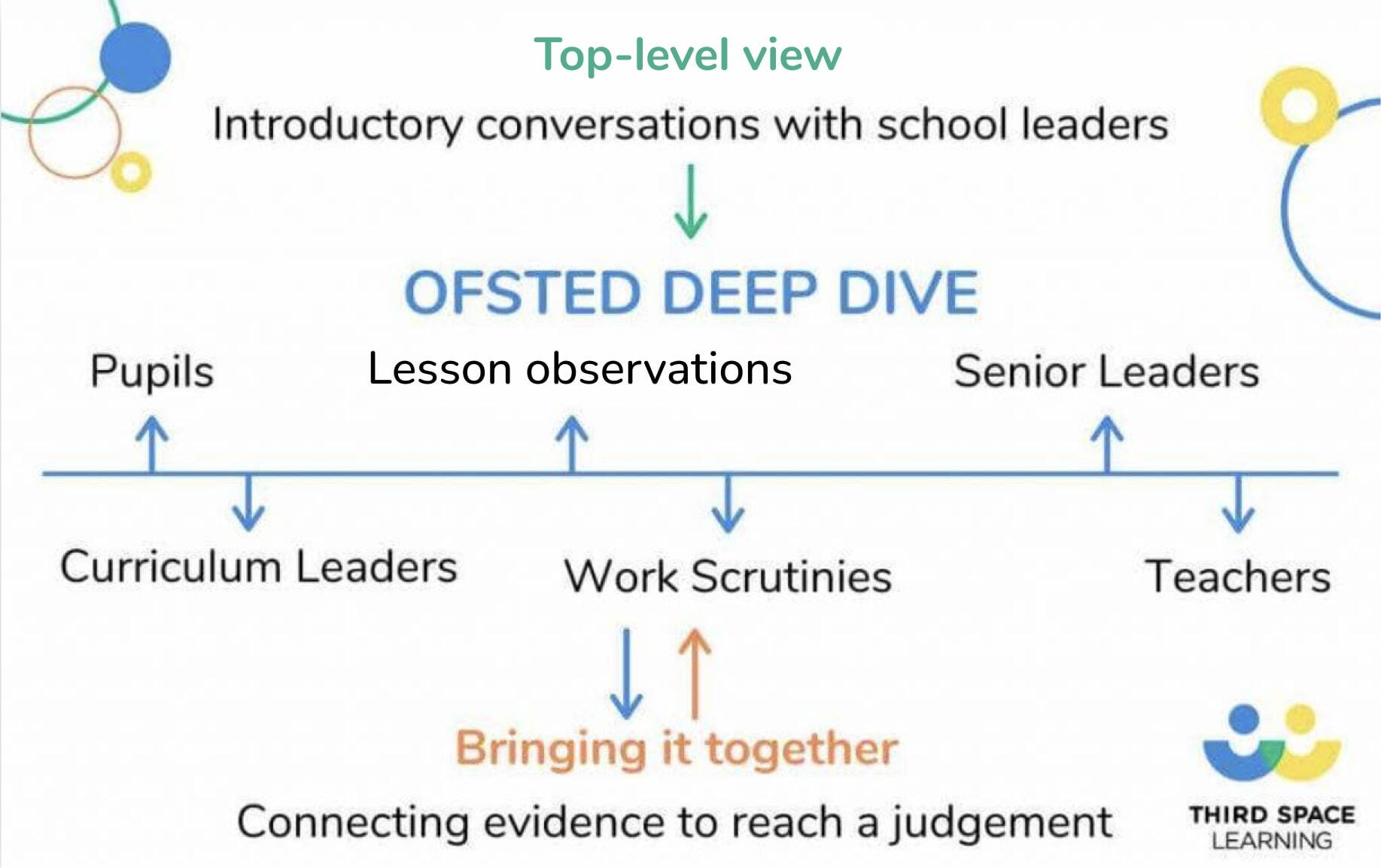
Top-level view
Before completing deep dives to assess the links between the curriculum, teaching and assessment, Ofsted requires a top-level view.
During top-level views, inspectors collaborate with school leaders, usually the headteacher, to gain an overview of the school’s curriculum.
They explore the learning opportunities available, the curriculum intent and sequencing, and the choices made.
Inspectors are looking for a broad and ambitious curriculum across the whole school.
It is at this point in the process that Ofsted inspectors select individual subjects for a deep dive in consultation with school leaders. Current curriculum content influences the subjects chosen for observation during the inspection. Schools may also suggest areas of strength and weakness for the inspector to consider.
Deep dive
Following an initial phone call, Ofsted inspectors visit the school in person the next day and carry out deep dives on their chosen subjects.
During Ofsteds’ deep dive, inspectors will conduct a series of deep dive questions while looking for links between the curriculum standards, teaching and assessment.
Final view
Following the deep dive, Ofsted brings all their evidence together and decides whether they need any further evidence to reach a satisfactory conclusion.
Non-curriculum areas are also subject to an Ofsted inspection. Safeguarding and behaviour judgements contribute to the final Ofsted grade.
Using the data gathered, Ofsted provides the school and parents with ratings and reports on the areas inspected.
What happens during an Ofsted deep dive?
Any member of school staff may ask themselves, ‘What do Ofsted look for?’
Despite deep dives taking place on any curriculum subject, the process for a deep dive is similar in any school.
During a deep dive, Ofsted inspectors may:
- Speak to curriculum leaders for chosen deep dive subjects
- Observe lessons connected to deep dive subjects and complete a work scrutiny, looking at pupils’ work, as part of the bigger curriculum implementation picture
- Speak with pupils from observed lessons to ensure the curriculum is having the desired impact and matches the lesson content and wider curriculum overview
- In primary schools, listen to pupils read an unknown book of an appropriate level
- Discuss with class teachers how the curriculum content and sequencing choices support effective learning for all pupils
- Establish a coherent evidence base for the quality of education
Which subjects do Ofsted inspect during a deep dive?
According to a new Ofsted analysis, in the 2022/2023 academic year, the number of deep dives conducted in primary schools was, on average, four. This typically increased to five subjects for secondary schools.
Unlike secondary schools, all primary school inspections include reading observations, as set out in the school inspection handbook.
Ofsted may inspect any of the remaining subjects, including one or more foundation subjects, in a deep dive.
After reading, the three most popular subjects for Ofsted to deep dive in primary schools during the 2022/2023 academic year were:
- Mathematics – 97% of inspections
- History – 46% of inspections
- Geography – 27% of inspections
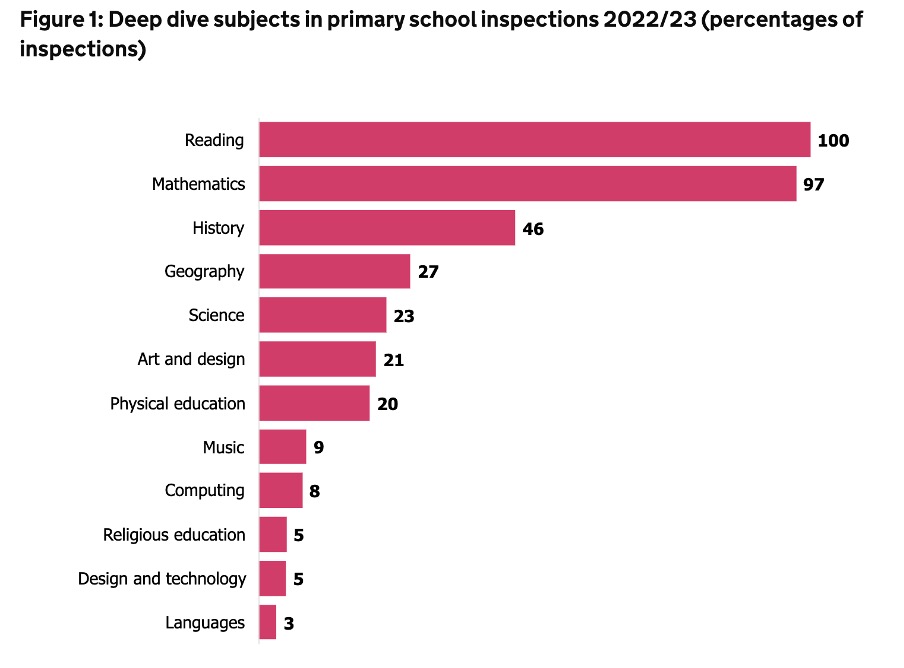
Percentage of deep dives per subject in primary schools 2022/23
Secondary schools share a broadly similar distribution of subjects. The top three subjects Ofsted conducted a deep dive on in secondary schools for the 2022/23 academic year were:
- English – 86% of inspections
- Mathematics – 77% of inspections
- Science – 60% of inspections
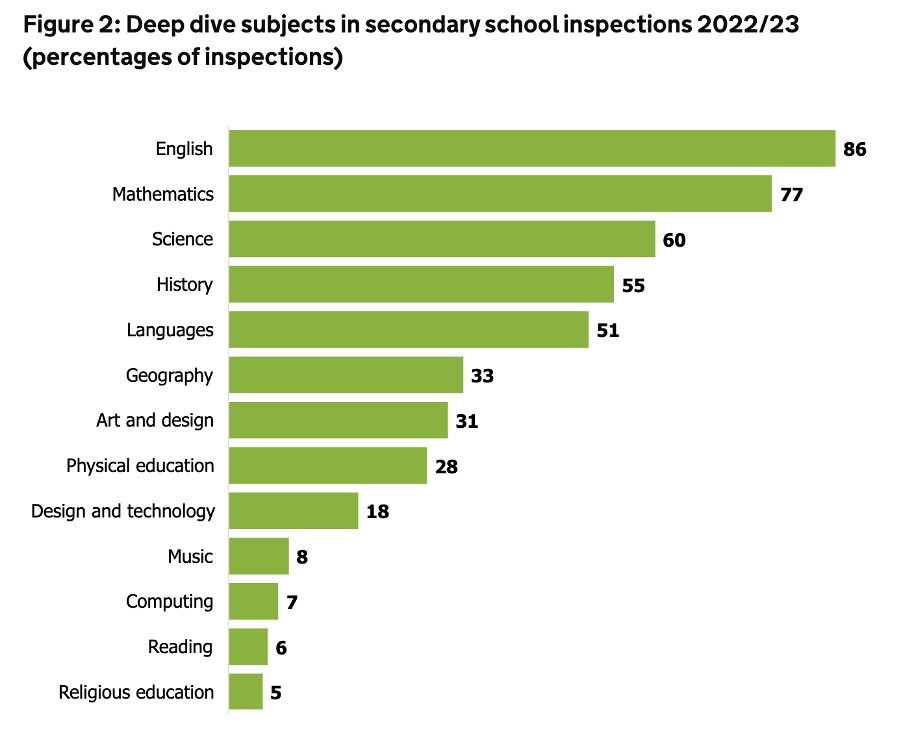
Percentage of deep dives per subject in secondary schools 2022/23
Analysis of deep dives from nearly 4,200 graded and ungraded inspections between 1 September 2022 and 31 May 2023. Special schools and alternative provision are not included in the data.
What to expect from an Ofsted deep dive in maths
As a core subject, there is a high probability that maths is one of the selected subjects for a deep dive in both primary and secondary schools.
When inspectors deep dive into mathematics, they will evaluate the quality of a school’s mathematics education, including remote teaching, through individual lesson observations and discussions with pupils as well as scrutiny of their work.
Discussions with curriculum leaders allow Ofsted inspectors to assess their understanding of the subject. They must explain the intent of the maths curriculum and the intent, implementation and impact of maths across the school for all pupils, including those with SEND.
Examining any published data provides Ofsted with a top-level view of maths in any given school. In primary schools, data may include KS1 and KS2 SATs results and the Year 4 multiplication tables check. GCSE and A-level maths results are examined in secondary schools.
This data combined with their deep dive questions allows inspectors to provide an Ofsted mathematics report assessing the schools’ maths curriculum, teaching and learning.
Inspectors will consider steps the school has taken to ensure that:
- Pupils understand and remember the mathematical knowledge, concepts and procedures appropriate for their year group curriculum content
- Pupils are prepared for the next stage, whether that is the next individual lesson, unit of work, year or key stage, including post-16 mathematics
- Curriculum sequencing builds mathematical knowledge and skills systematically and, over time, draws connections between mathematical ideas
- Curriculum content divides new material into manageable steps for individual lessons
- The leadership team and class teachers identify opportunities when mathematical reasoning and solving problems will allow pupils to make useful connections between maths and real-life
- Sufficient opportunities to revisit previously learned knowledge, concepts and procedures
- Curriculum planning is flexible to allow opportunities to close gaps in attainment
- Pupils can access learning through teaching models, procedures and resources
- All teachers of mathematics, including non-specialist teachers of mathematics,
- have sufficient content knowledge to deliver maths education effectively
Third Space Learning believes that every school is unique. Schools should customise the scheme to suit the context and needs of their school, whether that’s using a spiral curriculum or an alternative approach.
We provide non-prescriptive schemes to support target areas such as Fluent in Five for primary schools and Fluent in Five for Year 7 and GCSE (our daily arithmetic progression scheme aligned with the national curriculum and proven to improve arithmetic), or Rapid Reasoning (our daily reasoning progression scheme).
Download a free sample of 6 weeks of Rapid Reasoning questions!
Explore Third Space Learnings’ entire series of extremely popular daily lesson PowerPoints that match the White Rose Maths Small Steps for Year 1 to Year 6.
Our one-to-one interventions are personalised for each pupil. A team of academic experts design all lessons. Every lesson is delivered thousands of times to create perfect one to one learning lessons.
Using the Third Space Learning online platform, most schools have 15-20 personalised one-to-one interventions happening within a single hour of the school day, helping to create confident, able mathematicians whilst reducing teacher workload.
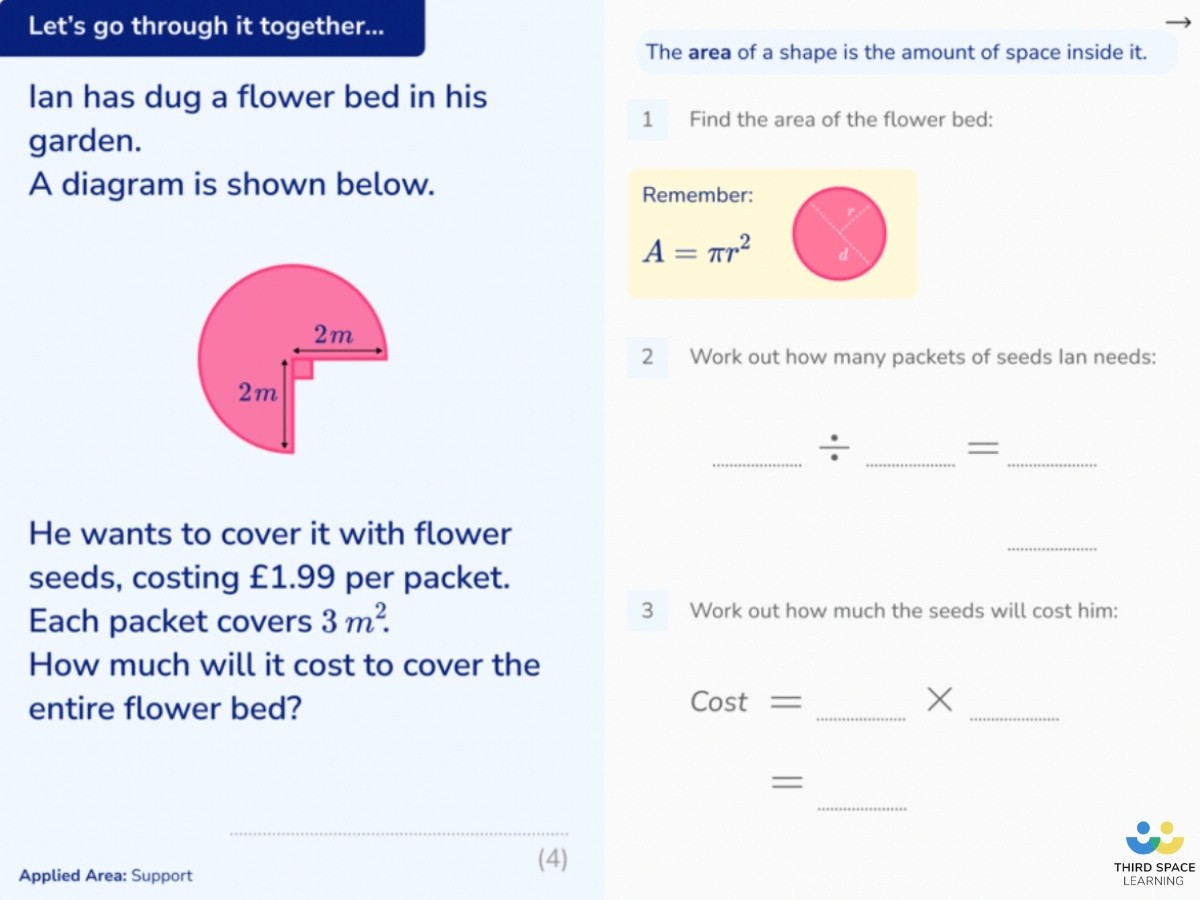
GCSE grade 4: Solving Area and Perimeter Problems
What to expect from an Ofsted deep dive in reading
A deep dive into reading is mandatory in primary schools. Inspectors are interested in how schools support early reading for all pupils — particularly post COVID-19.
Ofsted draws information from the school’s policy for teaching reading, phonics assessments and screening check results, and lesson visits.
Lead inspectors will pay particular attention to the lowest 20% of pupils who need to improve their reading. This will assess how well the school is teaching phonics and supporting all pupils to become confident, fluent readers.
During reading deep dives, Ofsted inspectors listen to low-attaining pupils from unseen books appropriate to the pupil’s key stage. When possible, inspectors will also listen to pupils read to a familiar adult.
When evaluating reading, Ofsted inspectors consider:
- How determined the school is that every pupil will learn to read
- A broad and ambitious reading curriculum, including stories, poems, rhymes and non-fiction
- Phonics programmes match or exceed the expectations of the national curriculum and the EYFS goals.
- The sequence of reading books shows a cumulative progression in phonics knowledge closely matched to the school’s phonics programme.
- The teaching of reading and systematic synthetic phonics from the beginning of Reception
- Ongoing assessment of pupils’ phonics progression is detailed to identify any pupil who is falling behind
- School staff have sufficient expertise in the teaching of phonics and reading
Deep dives in reading are not mandatory in secondary schools but as English is a core subject, there is a high probability it will be chosen.
What to expect from an Ofsted deep dive in EYFS
During an EYFS deep dive, Ofsted inspectors evaluate whether the curriculum is broad and ambitious in all 7 areas of learning:
- communication and language.
- personal, social and emotional development.
- physical development.
- literacy.
- mathematics.
- understanding the world.
- expressive arts and design.
While inspectors do expect the curriculum to develop EYFS pupils for the next stage of learning, they do not expect to see discrete lessons for individual subjects.
Instead, they look for the implementation of foundational knowledge to prepare children for the Year 1 curriculum and beyond.
Curriculum development from EYFS to Key Stage 1 should be clear. If Ofsted deep dive into history, they will look for examples where Reception pupils learn about the world around them.
There are no expectations to see paperwork or planning, but inspectors will engage in conversations with subject leaders to look at how book choices and circle time encourage discussion around foundational concepts.
How to prepare for an Ofsted deep dive
Schools prepare for a deep dive in much the same way as Ofsted school inspections in the past; keep books up to scratch for work scrutinies, follow the School Improvement Plan (SIP), and have an idea of the department’s wider strategy and curriculum intent.
Added to this, we recommend:
- Read the subject reports that Ofsted produce, such as their maths report
- Download Ofsted deep dive questions
- Work through tried and tested questions, thinking about how you’ll answer them at your next inspection
- Set out clear expectations about what you are trying to achieve for your pupils and how you are trying to achieve it. For all its similarities to past inspections, the deep dive framework is different, and getting information from those who’ve been through it already can benefit you.
‘Mocksted’ inspections and mock deep dives
A mocksted (or mock-Ofsted) is a ‘dress rehearsal’ of an Ofsted inspection that some schools use to gauge their readiness for the real thing. Mocksteds can be internal with senior staff acting as inspectors. Alternatively, schools may bring in outside ‘consultants’.
While considered the ‘in thing’ a few years ago, they’re now recognised as a pointless exercise causing staff unnecessary stress. They can even make performance during a real inspection worse.
Time is better spent using tried and tested questions and Ofsted crib sheets as guidance for discussion in CPD sessions and as a check for whether you have appropriate provisions across your school’s curriculum.
Deep dives since COVID-19
Much like everything else, the pandemic affected Ofsted inspections and deep dives. As well as skill progression, curriculum planning and CPD, in recent Ofsted deep dives, there has been a big focus on the impact of COVID-19, and what schools are doing to reduce it.
General discussions in a maths deep dive have included the impact of lockdown, core content missed, remote teaching and access to concrete resources. This particularly applies to pupil premium and SEN pupils. Ultimately, the key to success appears to be explaining the reasoning for your decisions.
Small schools and deep dives
Deep dives can seem particularly intimidating in small schools. Many small schools are nervous about the new framework and the high demand deep dives place on staff due to smaller staff numbers and school budgets.
That said, small schools use deep dives to assess whether the curriculum is broad, ambitious and achieving what it sets out to achieve.
Mike Sheridan, Regional Ofsted Director for London and former headteacher of a small school, shared his experience.
He worked with a group of 5 other small schools to develop a rich and broad curriculum while solving some tricky issues.
While this approach may be successful for some small schools, others are too remote to entertain the possibility of joining a MAT. For subject leaders in remote schools, this beginner’s guide to curriculum development may be beneficial.
To help tackle this problem, Ofsted inspectors take into account the way small schools organise their curriculum and leadership of subject areas. This includes teachers being out of class during inspections when they would not usually be.
Read More: What Makes An Oftsed Outstanding Teacher?
FAQs
A deep dive in maths looks like an Ofsted school inspection that focuses on ensuring maths progress for pupils and bridging the gap in maths between key stages.
The purpose of a deep dive is for Ofsted to establish a clearer idea of the overall teaching quality of a school by examining a national curriculum subject in detail.
A deep dive in school is an in-depth examination of a national curriculum subject by an Ofsted inspection team. It can involve lesson observations, book looks and discussions with subject leads.
DO YOU HAVE STUDENTS WHO NEED MORE SUPPORT IN MATHS?
Every week Third Space Learning’s specialist school tutors support thousands of students across hundreds of schools with weekly online 1 to 1 maths lessons designed to plug gaps and boost progress.
Since 2013 these personalised one to one lessons have helped over 150,000 primary and secondary students become more confident, able mathematicians.
Learn about the scaffolded lesson content or request a personalised quote for your schoolto speak to us about your school’s needs and how we can help.





![The 12 Most Important Ofsted Safeguarding Questions and Answers [2024]](https://thirdspacelearning.com/wp-content/uploads/2024/02/safeguarding-questions-and-answers-1-180x160.jpg)